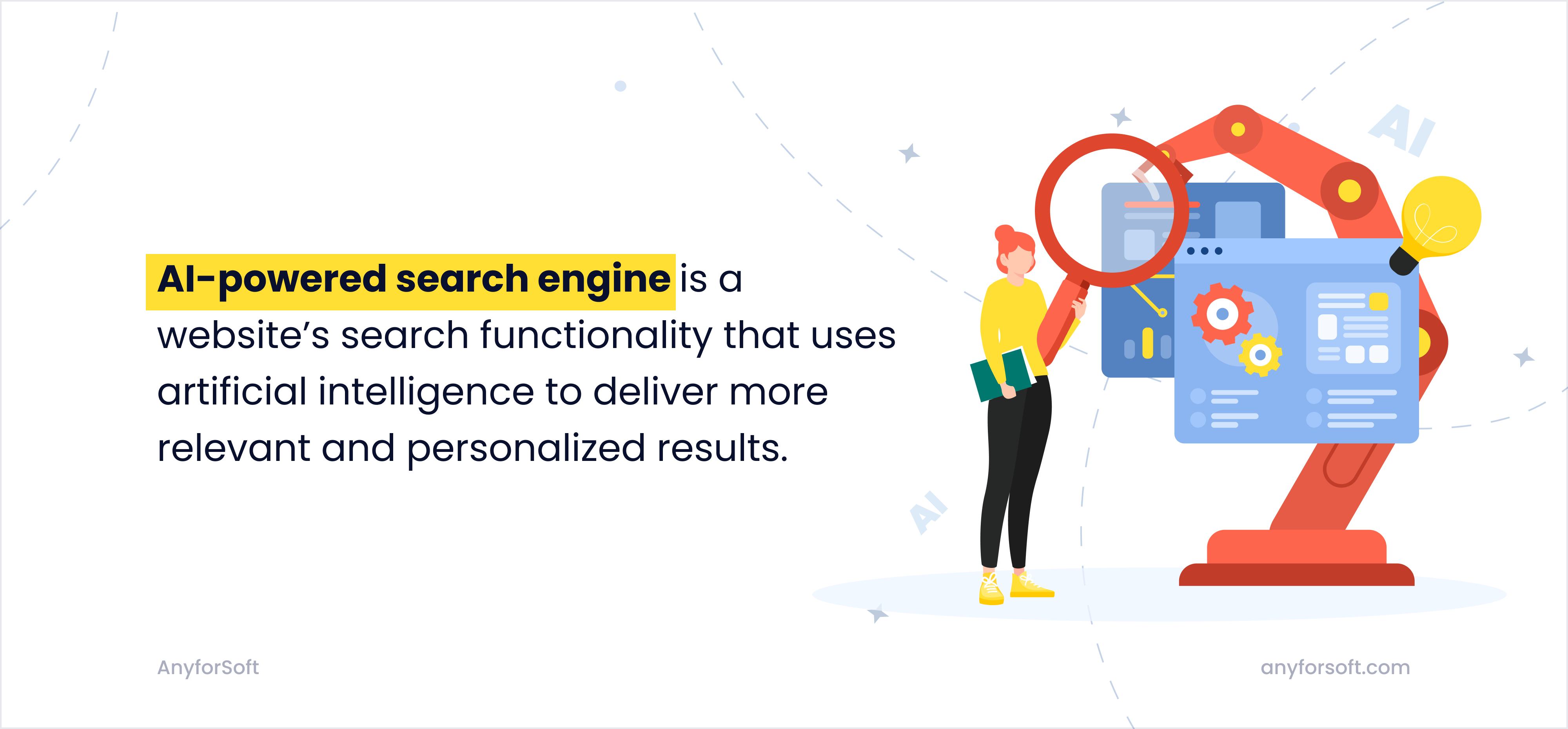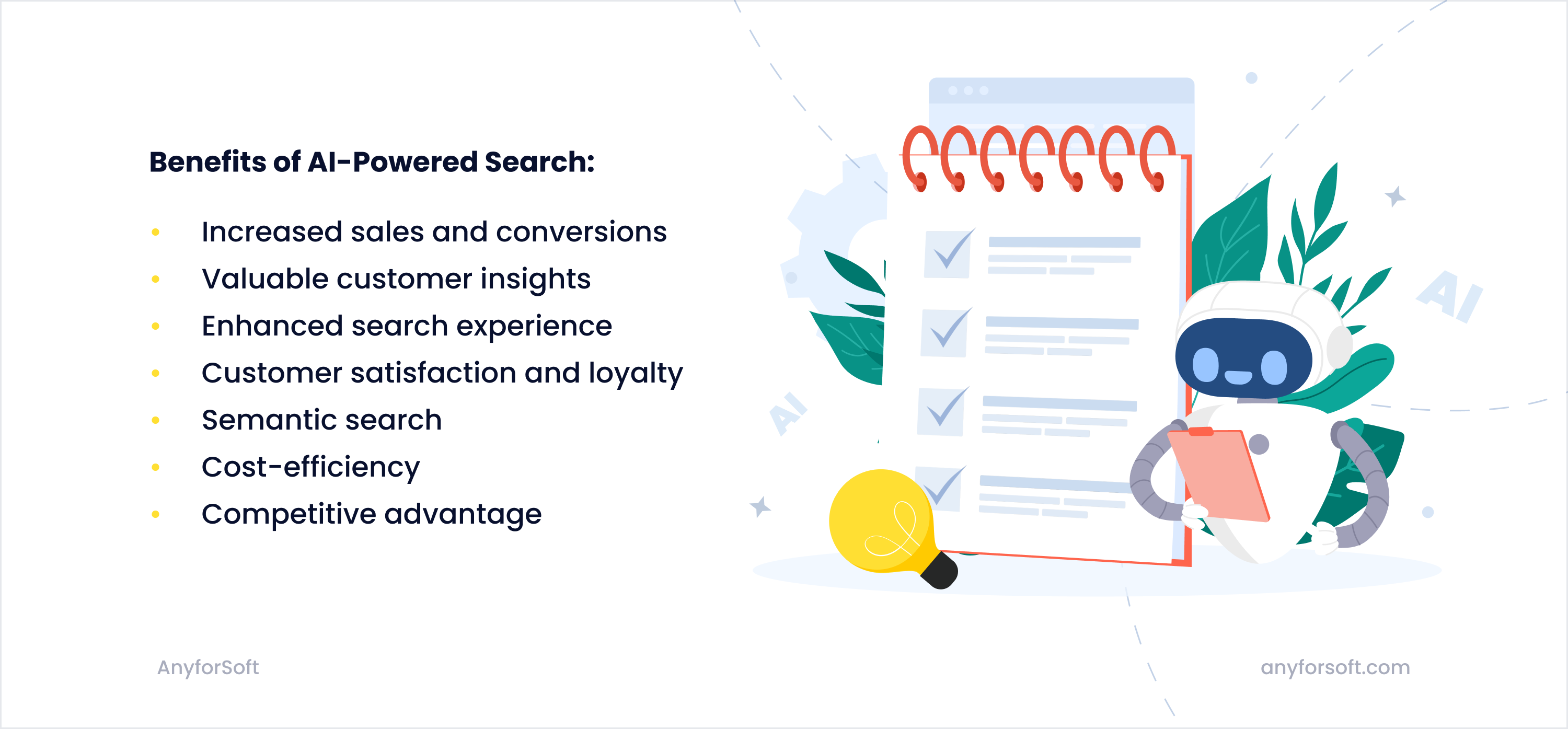Seek, and ye shall find. So goes a line from the New Testament. But when it comes to online shopping, it doesn’t always work. How many times have you searched for something and couldn’t find what you were looking for? Try to recall a moment when you entered a query into a search engine only to receive no or irrelevant results. What did you feel? Probably, frustration.
That’s what your customers experience when they can’t find what they need on your site. By not providing relevant search results to user queries, you damage the user experience, losing your clients. In fact, 50% of consumers are willing to switch brands if a company doesn’t anticipate their needs.
But how can you anticipate customer needs? How can you always offer exactly what your clients want?
The answer is AI-powered site search.
With the help of natural language processing (NLP) and machine learning (ML), an AI-driven search engine can understand the user intent and context behind a query, learn from user interactions with your site, and provide relevant content that matches user needs. Unlike a traditional search engine, it offers personalized search experiences for each customer, helping businesses boost customer satisfaction and loyalty.
In the following paragraphs, we will discuss what an AI search engine is, how it works, its difference from traditional search engines, and the benefits it can bring to your business.
Without further ado, let’s get started!
What is AI-Powered Site Search and How it Works
People who perform a search on a site are twice as likely to convert. That’s why it is critical to provide relevant content to user queries. With AI-based search, you will be able to accurately anticipate customer needs and provide them with what they want.
AI-powered search engine is a website’s search functionality that utilizes artificial intelligence to enhance the search experience. Unlike traditional site search that relies on basic keyword-matching algorithms, an AI search engine leverages natural language processing, which helps it understand the intent and context behind a query while recognizing synonyms, related terms, and natural language queries. Consequently, it can provide relevant search results even when the exact keywords entered by users are not present in product listings. For example, if a user uses unconventional language or terminology to describe a product (like “Device for removing wrinkles from clothes without an iron” for clothes steamer), an AI-driven engine can still understand their intent and retrieve what they’re looking for.
Another important distinction from traditional search is that AI-powered search systems can support multiple inputs, including voice search and image search. Amazon's AI-powered site search, for example, lets you search for a product with your phone’s camera: you can take or upload a photo of any item, and the platform will provide results containing the exact or similar items.
Apart from NLP, AI-powered search relies on machine learning. Machine learning algorithms analyze patterns in current and historical data to make predictions about future events or trends. When it comes to online shopping, they analyze user data and their interactions with a site: what products a user viewed, their purchase history, demographics, and other relevant information. Based on these factors, ML algorithms provide personalized results.
Let’s make it clearer with an example. Suppose a user purchases a Google Pixel 8 in your store. After some time, they come back and type “screen protector” into the search bar. In this case, a traditional search engine would return items based on their popularity, rating, number of purchases, and other ranking factors it is programmed to consider. The screen protector for that particular Google Pixel model may not rank high in the returned search results, so the user will have to spend a while scrolling the page down until they come across the desired item (or they will have to rephrase their initial keyword).
With an AI search engine, however, the case would be different. The system would analyze the user’s purchase history, recognize that they purchased a Google Pixel 8 recently, and rank screen protectors for this model first in search results. That’s how AI-driven search can anticipate the needs of your customers and understand their intentions even when they use generic terms like “screen protector”.

Traditional Search vs. AI-Powered Search
To understand AI-powered search even better, let’s compare it with traditional site search.
AI-powered search engine vs traditional search engine
The Benefits of AI-Powered Search
Now that you learned the basics of AI-powered search, let’s talk about how it can benefit your business:
- Increased sales and conversions. According to research from Accenture, 91% of customers are more likely to shop with brands that provide them with relevant offers. By utilizing an AI-based search engine, you will make sure your customers see the content that matches their needs and preferences whenever they initiate a search session. That will ultimately lead to increased sales and conversions.
- Valuable customer insights. One of the biggest benefits of AI search engines is that they can collect information about your customers. They enable you to learn your clients’ preferences, purchasing habits, queries they use, and more, helping you fine-tune your offerings and marketing strategies.
- Enhanced search experience. An AI search engine understands natural language queries, can provide relevant results regardless of how users phrase keywords, and allows consumers to search by image or with their voice. What’s more, it offers personalized search results for each client based on their preferences and past behavior. This enhances the search experience, making your website more user-friendly.
- Customer satisfaction and loyalty. When customers can effortlessly find what they’re looking for, they naturally feel satisfied. With AI-powered search, you will contribute to customer satisfaction and increase loyalty toward your brand.
- Semantic search. AI search engines go beyond keyword matching to understand the context and meaning behind search queries. This enables them to provide more accurate results, even when keywords are not explicitly mentioned. For example, when a user searches for “affordable bags”, AI-powered search engines recognize that the user is looking for budget bags and provide them with relevant content rather than displaying listings that contain “affordable bag” in the title or description.
- Cost-efficiency. Although AI search engines are expensive to implement, they prove to be more cost-effective in the long run. That has to do with the fact that AI-powered search is self-learning: it analyzes customer data and interactions to learn from them and improve search relevance over time. Thus it requires much fewer manual interventions and optimizations than a traditional search solution.
- Competitive advantage. Despite the multiple benefits AI search engines bring to multiple industries, businesses are still reluctant to develop them. Therefore, if you invest in such a system, you will gain a competitive edge over businesses that still rely on traditional search engines.

Wrapping Up
An AI search engine is an incredibly powerful tool that will boost customer satisfaction and loyalty toward your brand. By utilizing natural language processing and machine learning, it can provide relevant results for any queries users enter, which will eventually help you increase sales. More importantly, it allows your customers to express themselves however they see fit without compromising their search experience.
So if you want to make your website a more user-friendly and customer-oriented place, it’s probably a good idea to invest in AI-powered search.
AnyforSoft can help you develop one. We have over 12 years of development experience and have delivered 150+ projects, helping clients all over the world benefit from technological innovations. No matter how complex your project is, AnyforSoft’s experts are well-versed in multiple technologies and can create solutions that meet your needs and requirements.
Take full advantage of AI technology—contact us today and tell us about your project.
